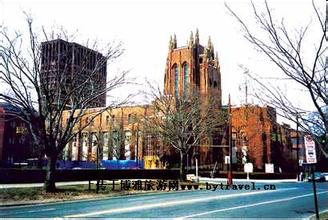1828年耶魯報告
Due to the industrial revolution and the increase in agriculture in the 19th century, there were many changes that affected higher education in the United States. Issues in controversy include: Church versus state control of higher education; the value of the college versus that of the university, and classical curriculum versus elective courses. The last issue mentioned will be the concern here.
19世紀(jì),隨著工業(yè)革命的發(fā)展和農(nóng)業(yè)的進步,出現(xiàn)了許多新的因素,沖擊著美國的高等教育。其中包括:高等教育應(yīng)由教會控制還是地方政府控制,學(xué)院與大學(xué)誰的價值更高,以及古典學(xué)科與選課系統(tǒng)的矛盾。此處將討論的正是古典學(xué)科與選課系統(tǒng)的矛盾。
To meet the varying demands of the community, as well as to accommodate the course of instruction to the rapid advance of the country, there was a gradual movement toward a more open, elective course of study at colleges around the United States. Advocates for change believed that curriculum should offer vocational education so as to prepare a man for living, and the curriculum should be relevant to commerce, industry, and agriculture. In this way, students would be able to pursue a specific plan of study so that he could learn a trade and become a positive contributor to the community in which he lived. In addition, they criticized Latin and Greek to be "dead languages" which should be replaced by practical courses. On the other side of the debate was the view that traditional curriculum should stay, called the "conservative view". Yale leaders are the representatives.
為了適應(yīng)社會不斷變化的需求,為了使大學(xué)的教程跟上國家前進的步伐,美國各地高校漸漸掀起了一場倡導(dǎo)開放式教學(xué)、實行選課制的浪潮。變革派堅持認(rèn)為,大學(xué)課程應(yīng)該提供職業(yè)化教育,教人謀生的本領(lǐng);授課內(nèi)容應(yīng)該涉及商業(yè)、工業(yè)、農(nóng)業(yè),這樣,學(xué)生在校期間便有一個明確的學(xué)習(xí)計劃,如此才能學(xué)精一個行業(yè),成為一個能為其所屬集體積極貢獻力量的人。此外,變革派還批判拉丁語、希騰語為"死了的語言", 建議由實用學(xué)科取代這些課程。與之相反,有些人認(rèn)為應(yīng)該保留這些傳統(tǒng)學(xué)科,因而被稱作"保守派"。耶魯大學(xué)的校領(lǐng)導(dǎo)是這一派的代表人物。

In September, 1827,Yale president Reverend Jeremiah Day organized a group of professors to discuss the future of classical curriculum. The Yale Report of 1828,being the resolution of the committee of the Yale corporation, was issued to rebut critics who were challenging the classical curriculum. It was made out in two parts: one containing a summary view of the plan of education at Yale and a general discussion of the nature of liberal education, composed by the President Jeriemiah Day; the other, an inquiry into the expediency of insisting on the study of the ancient languages, argues for the retention of Greek and Latin literature in the college curriculum, written by professor James L.Kinsley. It was firstly issued in American Science and Art Journal as A Report on the Course of Liberal Education, later on called The Yale Report.
1827年9月,耶魯大學(xué)校長杰里邁亞.戴牧師組織一批教授研討古典學(xué)科的去留問題。次年,發(fā)表了著名的《1828年耶魯報告》。耶魯集團董事會通過這項報告,就是為了反駁那些挑戰(zhàn)傳統(tǒng)學(xué)科地位的人。報告共分兩部分:前一部分主要對學(xué)院教學(xué) 計劃進行考察分析,討論自由教育的本質(zhì),由院長杰里邁亞·執(zhí)筆;后一部分是為古典語文教學(xué)辯護,論證保留希臘、拉丁文學(xué)的必要性和可行性,由詹姆斯L·斯利教授執(zhí)筆。這個報告最初發(fā)表在《美國科學(xué)與藝術(shù)學(xué)刊》上,題為《一份關(guān)于博雅課程 的報告》,后來,人們習(xí)慣稱之為《耶魯報告》。












